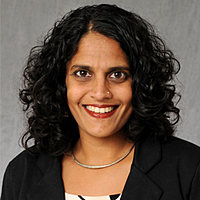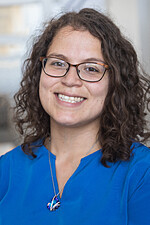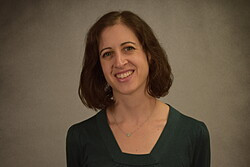Intersectionality is a critical theoretical framework that emphasizes the influence of intersecting systems of oppression on the lived experiences of people marginalized by inequity. Although applications of intersectionality are increasing in public health, this framework is absent in environmental health, which has instead focused on the exposome, a paradigm that considers the totality of an individual’s environmental exposures across the life course. Dr. Ami Zota discussed how integrating intersectionality into the exposome can help advance environmental justice and health equity. She introduced concepts and tools for environmental public health scientists interested in operationalizing this approach. Lastly, she discussed examples of this approach from her transdisciplinary work on racial inequities in uterine fibroids highlighted in her new commentary.
Following Dr. Zota’s presentation, Dr. Camila Alvarez presented her new study, Intersectional environmental justice and population health inequalities: A novel approach. She introduced a novel Eco-Intersectional Multilevel (EIM) modeling approach used to examine intersectionality at the neighborhood-level using data from the EPA's NATA 2014 estimates of cancer risk from air toxics. She highlighted how this approach estimates the interaction effects of environmental health hazards for several neighborhood-level demographics. Dr. Alvarez then discussed how this new methodological approach demonstrates a largely intersectional story of environmental health risk at the national level.
Dr. Rebecca Mandell presented findings from a study that identified intersectionality as a collective action frame (CAF) used by advocates mobilizing at the intersection of the environmental justice and reproductive justice movements to address toxic exposures and reproductive health outcomes in vulnerable communities. Advocates used an intersectionality frame to highlight how intersecting social locations (e.g. gender, race/ethnicity, income) shape risk of toxic exposures; equally prioritize multiple aspects of their identities when mobilizing; develop multi-issue platforms; and form cross-movement collaborations to more powerfully create social change. Understanding an intersectionality frame can help to inform advocacy approaches to promote health and health equity, particularly those focused on policies and structural drivers of health.
Featured Speakers
 Ami Zota, ScD, MS, is an Associate Professor at the Department of Environmental & Occupational Health at the George Washington University Milken Institute School of Public Health. She directs the ARISE-EJ lab at GW whose mission is secure environmental justice and improve health equity through advancements in science, policy, clinical practice, and communication.
Ami Zota, ScD, MS, is an Associate Professor at the Department of Environmental & Occupational Health at the George Washington University Milken Institute School of Public Health. She directs the ARISE-EJ lab at GW whose mission is secure environmental justice and improve health equity through advancements in science, policy, clinical practice, and communication.
Her current research examines how social-structural factors, such as racism, classism, and sexism, shape environmental chemical exposures and the health of women and children. Ami is equally committed to science communication and diversifying the scientific enterprise. Her work has been featured in high-impact national and international media publications including the Washington Post, USA Today, and the Atlantic Monthly and has helped shape health and safety standards for consumer product chemicals. Ami recently launched the Agents of Change in Environmental Health initiative with Environmental Health News to amplify voices of future environmental health and justice leaders from under-represented groups. In 2017, Dr. Zota was recognized as a Pioneer under 40 in Environmental Public Health by the Collaborative on Health and the Environment. Twitter: @amizota
 Camila H. Alvarez, PhD, is an Assistant Professor of Sociology at the University of California, Merced. Dr. Alvarez received her PhD and MA in Sociology from the University of Oregon and her B.A.s in Sociology and Mathematics from the University of Nevada, Las Vegas. She specializes in air pollution, social inequalities, environmental justice, and quantitative methodology. Her research focuses on how environmental problems manifest as a result of social and systematic inequities. Moreover, she has an interest in informing quantitative methodology with social and environment justice frames. Dr. Alvarez’s research has been published in Social Science & Medicine, Sociological Perspectives, Environmental Sociology, Socius,and Nature & Culture. Twitter: @C_H_Alvarez Website: https://sites.ucmerced.edu/calvarez55
Camila H. Alvarez, PhD, is an Assistant Professor of Sociology at the University of California, Merced. Dr. Alvarez received her PhD and MA in Sociology from the University of Oregon and her B.A.s in Sociology and Mathematics from the University of Nevada, Las Vegas. She specializes in air pollution, social inequalities, environmental justice, and quantitative methodology. Her research focuses on how environmental problems manifest as a result of social and systematic inequities. Moreover, she has an interest in informing quantitative methodology with social and environment justice frames. Dr. Alvarez’s research has been published in Social Science & Medicine, Sociological Perspectives, Environmental Sociology, Socius,and Nature & Culture. Twitter: @C_H_Alvarez Website: https://sites.ucmerced.edu/calvarez55
 Rebecca Mandell, PhD, MS, is a qualitative and mixed methods researcher at Arbor Research Collaborative for Health. She received her PhD from the University of Michigan (U-M) School of Public Health where she researched how advocates are mobilizing to protect vulnerable communities from toxic exposures harmful to reproductive health. While at U-M, she was a fellow at the Graham Sustainability Institute and in the Reach the Decision Makers Training Fellowship through the University of California, San Francisco Program on Reproductive Health and the Environment. She also served as co-editor-in-chief of the Michigan Journal of Sustainability and worked for the Community Engagement Core of the Michigan Center on Lifestage Environmental Exposures and Disease, a National Institute of Environmental Health Sciences Core Center. She previously worked for the New York City Department of Health and Mental Hygiene, the New York AIDS Coalition and the Harvard School of Public Health, and served as a Peace Corps health volunteer in Niger. She received her master’s degree from the Harvard School of Public Health and her bachelor’s degree from Harvard University.
Rebecca Mandell, PhD, MS, is a qualitative and mixed methods researcher at Arbor Research Collaborative for Health. She received her PhD from the University of Michigan (U-M) School of Public Health where she researched how advocates are mobilizing to protect vulnerable communities from toxic exposures harmful to reproductive health. While at U-M, she was a fellow at the Graham Sustainability Institute and in the Reach the Decision Makers Training Fellowship through the University of California, San Francisco Program on Reproductive Health and the Environment. She also served as co-editor-in-chief of the Michigan Journal of Sustainability and worked for the Community Engagement Core of the Michigan Center on Lifestage Environmental Exposures and Disease, a National Institute of Environmental Health Sciences Core Center. She previously worked for the New York City Department of Health and Mental Hygiene, the New York AIDS Coalition and the Harvard School of Public Health, and served as a Peace Corps health volunteer in Niger. She received her master’s degree from the Harvard School of Public Health and her bachelor’s degree from Harvard University.
This webinar was moderated by Karen Wang, PhD, director of CHE. It lasted for 70 minutes and was recorded for our call and webinar archive.
